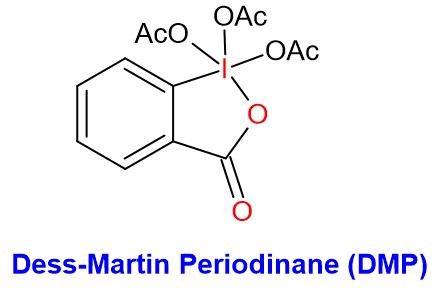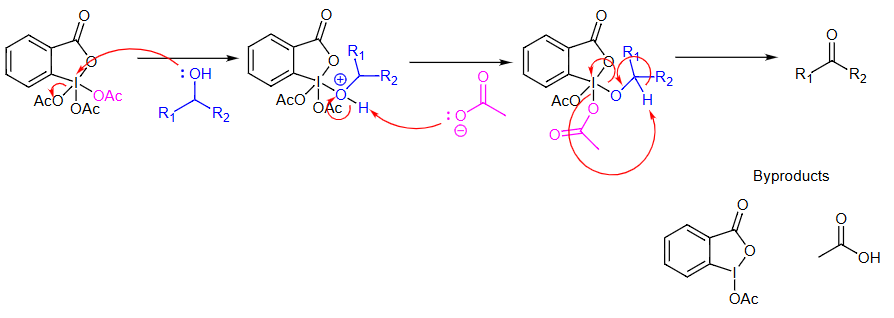& Mechanism
Green Chem.
& Mechanism
Reaction & Reagents info

- Dess-Martin periodinane (DMP) is a mild oxidizing agent that converts primary alcohol to aldehyde and secondary alcohol to ketone
- DMP is very similar to IBX in reactivity. The presence of acetate groups makes DMP more soluble in a wider range of solvents compared to the IBX reagent
Advantages
- The reagent, being mild, the reaction shall be performed under room temp. and neutral pH. Hence, it shows high chemoselectivity and tolerance towards most functional groups.
- The reaction is usually shorter duration, involves simple work-ups and results in high yields.
- Also, it is less toxic, compared to chromium-based alternatives (PCC and PDC)
Disadvantages
- DMP is shock sensitive and potential explosive
- It is quite expensive
- Being higher molecular weight, quite a lot of material is to be used. Atom efficacy is poor from Green Chemistry’s perspective
Useful Links on Reagent & Reaction:
- Dess-Martin Periodate (DMP) (Reagent Guide, ACS Green Chemistry Institute) – Green Chemistry info.
- Dess-Martin Oxidation (SynArchive) – Excellent compilation of reaction schemes with references
For review papers and other articles,
refer to the tab "References"
Mechanism
Dess-Martin Periodinane Oxidation – Mechanism:

Additional details

General Procedure:
To a solution of substrate (alcohol; 1 eq.) in CH2Cl2 (10 Vol) is added Dess-Martin periodinane (1.2 eq.) at RT and stirred for 2 to 4 h. The reaction is monitored by TLC.
The reaction mixture is then washed with a solution of 10 % Na2S2O3 in water (10 Vol) followed by saturated solution of NaHCO3 in water (10 Vol), and the layers separated. The aqueous layer is extracted with DCM (10 Vol). The organic layers are combined and washed with water (10 Vol) and brine solution (5 Vol). The resultant organic layer is dried over Na2SO4 and concentrated. The crude product shall be used for next reaction or if required, is purified by column chromatography
Note:
- As DMP is shock sensitive and potential explosive, it has to be handled with extreme caution. There are several other reagents available that are relatively safe to handle
- The most preferable solvent is DCM and the reaction is usually done at RT
For more details on reactions and reagents,
refer to the tab "Reaction, Reagents and Mechanism"
Typical Procedure:
- Oxidation of an acetylenic alcohol (ChemSpider) — Open access
- DMP Oxidation (OrgSyn) — Open access
- DMP Oxidation (TCI) — refer to sub-section “Applications & Literature” — Open access
- Dess-Martin Oxidation of allylic alcohol (ChemSpider) — Open access
For more details on large-scale reactions and OPRD procedures,
refer to the tab "Scale-up & Green Chem"
WO2007128568, page no. 63

WO2007121484, page no. 96

WO2016011390, page no. 400

WO2010026121, page no. 33

Green Chem.
DMP is not a suitable oxidizing agent for larger scale reactions owing to following reasons:
- DMP is shock sensitive and potential explosive
- It is quite expensive
- Being higher molecular weight, quite a lot of material is to be used. Atom efficacy is poor from Green Chemistry’s perspective
Only very few examples are available on the use of DMP on bulk scale
- Scale-Up Syntheses of Two Naturally Occurring Procyanidins: (−)-Epicatechin-(4β,8)-(+)-catechin and (−)-Epicatechin-3-O-galloyl-(4β,8)-(−)-epicatechin-3-O-gallate (OPRD, 2007) – 315 g of DMP has been used.
Alternative to Dess-Martin Periodinane Oxidation for Scale-Up:
- Parikh-Doering Oxidation (DMSO, py.SO3)
Green Chemistry Aspects:
Dess-Martin Periodinane – References:
Hypervalent Iodine Reagents – Review:




